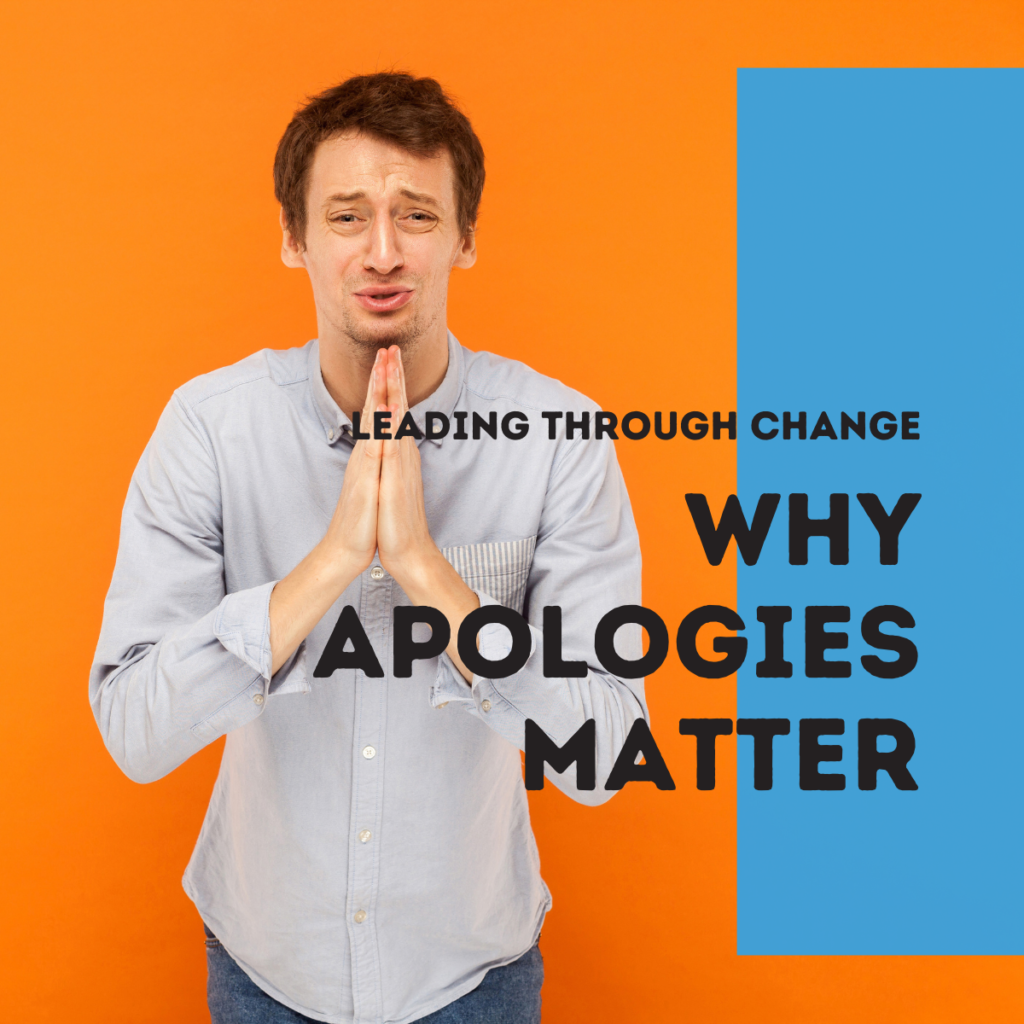Any change project brings plenty of opportunities to practice your skills to apologize. In fact, the art of genuinely and credibly apologizing to me more and more seems a key enabler of change projects.

Have you ever thought about your own skill of apologizing in important private or professional situations? Apologizing to your partner or kids, to your friends, to colleagues – for being late, for forgetting half of the shopping list, for missing someone’s birthday for lacking the time to answer an important email? Why not reflecting a little more on this in the next days: observe yourself and count the number of apologies that you make in a day. You will most likely count an amazingly high number. Many of these you will identify as “routine apology” rather than a sincere, genuine heartfelt apology. And that should make you think about the meaning and use of apologies.
Virtually every change project comes with plenty of reasons and opportunities to apologize. And it usually starts straight on day 1: “We are very sorry, but we will have to ask you to change your routines…” And then during the project, many things will eventually differ from your initial plan – again plenty of room to apologize.
Studies and research on apologies cover an impressive array, including cultural aspects (workers in the UK on average apologize about more than 4000 times per year – leading to 80% of Brits feel that the word “sorry” carries little value anymore – the situation in the US is fairly similar).
But just like in private and personal life, apologies come with a risk. With apologies that are seen as fakes or otherwise somehow non-genuine, you gamble with the projects overall credibility. With apologies that are in fact turned in to blaming others, you are doing more harm than good. And after all, you are missing an opportunity to effectively connect on an emotional and personal level with your most important partners and stakeholders in the change process. So let’s look at a few common mistakes in apologizing:
Mistake 1: Overdo it
Similar to private life, saying “I’m sorry” for every little thing will lead to people de-valuing your apologies. This means you are losing the power of an apology for important situations. It makes it harder to spot when an apology is thoughtful and sincere. The pure amount of apologies makes it harder to spot for your audience when an apology is actually thoughtful and sincere.
Mistake 2: Underdo it
Especially in senior-management-driven change projects, there is a tendency to not talk about problems or difficulties. This will always result in situations where problems become obvious to everyone, but nobody will officially address it or take responsibility. The positive power of an apology to support a change project is often underutilized. An apology can create personal closeness, it can serve as a valve for frustration and emotions and it can be an opportunity to re-build credibility, trust and motivation.
Mistake 3: Misuse an apology for denial or blame
Nothing makes your apology lose more power than attempts to relativize or “qualify” the apology. When you observe your personal behaviour, you might notice the few times that you just said: “I’m sorry.” Usually, we add explanations somewhat instinctively. These will create an impression of half-heartedness and immediately We are basically giving excuses camouflaged as apologies. Examples required? Sorry, I’m late, but my last meeting ran over. Sorry for my late response to your message, but I’ve been so busy lately. In many of these occasions, the additional justification is even part of our self-protection – as we ourselves try to find a reason that we missed meeting our own standards or keeping promises.
Mistake 4: Don’t go the extra-mile for a genuine apology
If you have really messed up in a private situation – you will know it will need more than warm words to fix it – we buy flowers, chocolate, jewellery, write poems or design a four-course candlelight dinner. For some reason, we find it hard to learn from this every-day observation for our professional contexts. Management not only finds it hard to genuinely apologize for a mistake or problem in the first place but when they make it to an apology they will often keep it general and don’t display properly matching words and actions. For an apology to be taken seriously you need to think of matching symbols and actions that underpin the core message. This starts with the format of the apology: is it given by email, through a recorded video message or in a live meeting? Think of the meaning of a handwritten card or personally signed letter compared to a standard email text. But you should also keep in mind the supporting meaning of accompanying behaviours. Is there a personal consequence related to the mistake? Is there any indication of how the negative impact would be compensated? Is there an explanation of how such mistakes or problems will be avoided in the future? Keep these questions and symbols and their emotional effects in mind.
Summary: especially change projects bear the risk of apologizing either too often or too little – with negative implications for not only the motivation of the involved stakeholders but also for the mutual trust and respect. Reflecting on how you are using apologies in and around change projects will enable you to use apologies in a more effective way.
